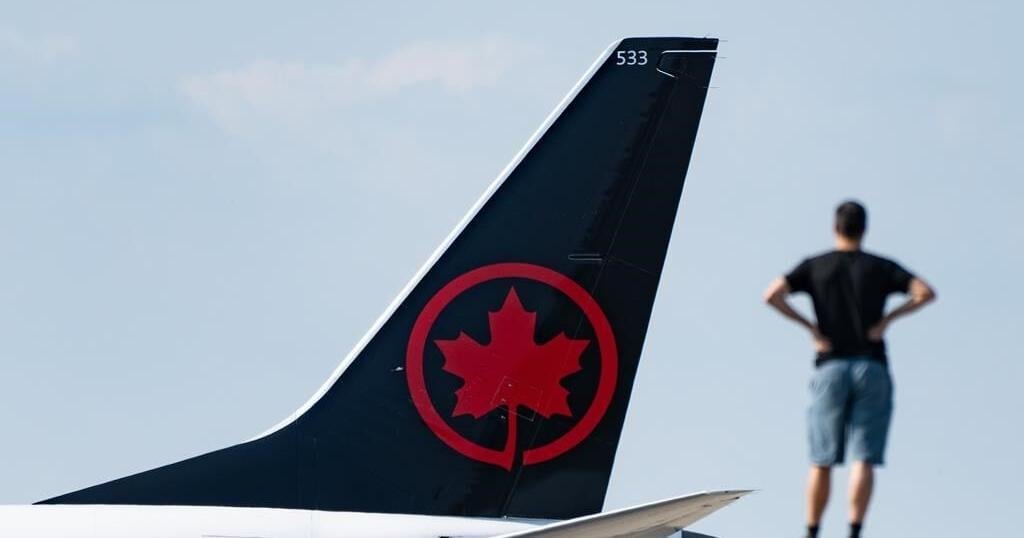MONTREAL – Travellers, business groups and politicians expressed fervent relief on Sunday after Air Canada and the union representing thousands of its pilots negotiated a new labour deal and averted a disruptive, countrywide shutdown.
Canada’s largest air carrier announced shortly after midnight Sunday that it had reached a tentative, four-year collective agreement with the Air Line Pilots Association.
The deal, reached after more than a year of contract negotiations, ended the possibility that the 5,200 Air Canada pilots represented by the union could be locked out or walk off the job. Any such move would have forced the airline to suspend nearly all operations, a prospect that raised concerns among business groups, passengers and even the prime minister.
At Toronto’s Pearson International Airport, travellers preparing for Sunday departures were breathing a sigh of relief.
“I wasn’t looking forward to an Air Canada strike, because I booked this ticket like a month and a half back, so a last-minute change would have been pretty bad,” said Arjun Pandit, who was heading to New York City for work. “It would have halted the entire trip.”
Donna Holloway, who had booked a connecting flight to Chicago, said she hadn’t made any back-up plans and would have tried to change her flight at the airport if a work stoppage had been announced. She received an email Sunday morning saying her flight was still scheduled. “I was really confident that they would settle the dispute and so far I’ve been happy,” she said.
Federal Labour Minister Steven MacKinnon issued a statement shortly after the deal was announced praising both sides for avoiding a work stoppage.
“Thanks to the hard work of the parties and federal mediators, disruptions have been prevented for Canadians,” MacKinnon said on social media. “I wish to salute the efforts of Air Canada and its pilots, who approached the discussions with seriousness and a resolve to get a deal.”
The tentative agreement averts a strike or lockout that could have begun as early as Wednesday for Air Canada and Air Canada Rouge, with flight cancellations expected before then.
“The new agreement recognizes the contributions and professionalism of Air Canada’s pilot group, while providing a framework for the future growth of the airline,” the carrier said in a statement.
It said Air Canada and Air Canada Rouge will continue to operate as normal while union members vote on the tentative four-year contract.
Air Canada said the terms of the new deal will remain confidential pending a ratification vote by the membership, expected to be completed over the next month, and approval by the airline’s board of directors.
The union issued a statement after midnight Sunday, saying if ratified, the tentative agreement will generate an approximate additional $1.9 billion of value for Air Canada pilots over the course of the agreement.
“The consistent engagement and unified determination of our pilots have been the catalyst for achieving this contract,” said First Officer Charlene Hudy, chair of the Air Canada ALPA MEC.
The deal also represents progress on several key issues including compensation, retirement and work rules, she added.
Air Canada said customers who changed flights originally scheduled between Sunday and Sept. 23 under its labour disruption plan can change their booking back to their original flight in the same cabin at no cost, provided there is space available.
A full-scale shutdown seemed likely in the days leading up to Sunday’s announcement. The two sides had said they remained far apart on the issue of pay, a central sticking point in the negotiations that had stretched for more than a year.
The pilots’ union argued Air Canada continued to post record profits while expecting pilots to accept below-market compensation. It had also said about a quarter of pilots report taking on second jobs, with about 80 per cent of those doing so out of necessity.
The airline said it had offered salary increases of more than 30 per cent over four years, plus improvements to benefits, and said the union was being inflexible with “unreasonable wage demands.”
Air Canada and numerous business groups had called on the government to intervene in the matter, including the Canadian Federation of Independent Business and the Canadian and U.S. Chambers of Commerce.
The Canadian Chamber of Commerce joined the chorus of those voicing relief on Sunday.
“We hope to see (the tentative agreement) ratified by membership in the coming month, putting an end to the uncertainty of Canadian travellers, as well as businesses and communities who depend on Air Canada’s cargo network every day,” CEO Candace Laing said in a statement.
The union vehemently opposed government intervention, with ALPA President Capt. Tim Perry issuing a Friday statement asking Ottawa to respect workers’ collective rights and refrain from getting involved in the bargaining process. He said government intervention violates the constitutional rights and freedoms of Canadians.
For his part, Prime Minister Justin Trudeau said it was up to the two sides to hash out a deal.
Trudeau said Friday the government wasn’t just going to step in and fix the issue, something it did promptly after both of Canada’s major railways saw lockouts in August and during a strike by WestJet mechanics on the Canada Day long weekend.
He said the government respects the right to strike and would only intervene if it became clear no negotiated agreement was possible.
Air Canada had already begun preparing for a possible shutdown, saying its cargo service had stopped accepting items such as perishables and indicating a wind-down plan for passenger flights would take effect if a notice of a strike or lockout was issued.
The tentative deal averts travel disruptions for the 670 daily flights on average operated by Air Canada and Air Canada Rouge, and the travel of more than 110,000 passengers.
This report from The Canadian Press was first published Sept. 15, 2024.
— With files from Ritika Dubey in Toronto
Companies in this story: (TSX:AC)

























